|
Versión en español
Due to the recent release of one of his last works (Godsend) we contacted Brian to see if he was interested in a brief interview about the movie. During our conversation (that was intended to be short and ended up in 50 minutes) we could confirm what we already suspected: that we were talking not only to a great composer but to a soundtrack and film lover. That fact made what you're about to read more enjoyable if possible. From here we want to thank Brian for his help and kindness in getting this interview done.
Seville, May the 20th. 20 PM (local time)
A distant bell rings
BSO Spirit (BS): H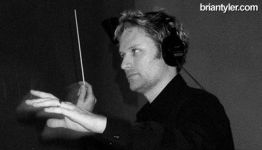 i, can I speak to Brian? i, can I speak to Brian?
Brian Tyler (BT): Well, hello there!
BS: Hi, how are you doing?
BT: Fine, I was just finishing composing some things for my last work.
BS: Being?
BT: Oh, a film called Paparazzi from Icon Films (you know, the Mel Gibson company)
BS: Yeah, I know. Well, then if you're ready we can begin...
BT: Ready as it can be...
BS: How did you first got involved in Godsend?
BT: Well, it's kind of a funny story. Nick Hamm (the director) was editing some parts of the movie and was using music from Panic for the temp-track. So I suppose it was his idea to go and call me, and find whether or not I was interested in composing the film's soundtrack.
BS: So it was him who contacted you?
BT: Exactly.
BS: And how was your relation with him?
BT: GREAT. It was very easy to work with him. Nick is what you could call a composer's dream. He knows exactly the tone of the music he wants to use in the film and the atmosphere he wants to create with such music, but gives you total freedom to compose whatever you find appropriate to achieve that environment.
BS: So, 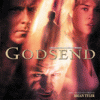 what kind of indications did he give to you? what kind of indications did he give to you?
BT: Well, with Godsend the thematic material was divided in three groups. The first one was the cloning, the second one the themes for Adam and Zachary and the third one what you should call the incidental music. The first one developed itself with this harmonic motifs that kinda change and mutate and become a clone of themselves as the theme goes throughout the main titles... and as it goes trough the film it changes in a more distant and has less to do with the original theme as a metaphor of the original boy becoming more and more different... the main title emphasizes science and technology and the wonderment and the spectacle of it all, it doesn't play up the horror, the drama or the emotional component of the film... that is found more in Adam's theme, which was the first thing I composed for the film...
BS: Yeah, the piano theme that describes perfectly the ordeal that this family will have to go through...
BT: Exactly, and if you think about it, Adam's theme starts upon when he dies and it's played like an echo of Adam but over his parents... and much like cloning, it's a reflection of the original.
BS: 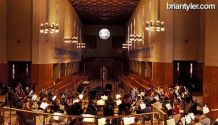 Firmly opposing Adam's theme (which as we have already told is composed for piano) we find Zachary's theme in which the strings section is the absolute protagonist. Was that decision related to the fact of Zachary being Adam's nemesis? Firmly opposing Adam's theme (which as we have already told is composed for piano) we find Zachary's theme in which the strings section is the absolute protagonist. Was that decision related to the fact of Zachary being Adam's nemesis?
BT: Absolutely. Zachary's theme is kind of the converse of Adam's... and if you go deeper in both of them you will find that you cannot find anything of Zachary's theme in Adam's; but as you go trough Zachary's theme you can find parts of Adam's because the dominating personality in the film is Adam and as the film advances what you can find is that the actual boy is a hybrid of the two... and there's a cue in which Adam's theme have a major third and a minor third, and the opposite in Zachary's theme, and in the movie they're played at the same time, creating a very nasty feeling like this (Brian plays the piano)...
BS: Yeah, I recall that piece...
BT: ...but thematically it never goes beyond that, in the movie the music stays within the round of melodic music closer to Debussy and the sense of inevitability that you can find in his work...
BS: Sorry, did you just say Debussy?
BT: Yes, why?
BS: Do you like Classical Music?
BT: Yeah, I love it!!!
BS: Whoa! That I didn't expect!!!! I love classical music...
BT: Well (laughs), I did not expect that neither... that's not what you can find in a normal interview... (laughs)
BS: (laughs) Who said this was normal?
BT: (strongly laughing) Yep, in that you're right...
Basically I intended to avoid the usual musical approach to the horror film genre and instead compose a music that listened without the movie was to be completely devoid of any reference to any genre at all. You would listen to it and wonder "what is this movie about?"...
BS: To tell you the truth I think you achieved that...
BT: Well, thanks man!
BS: And it's funny that you have told me about the Debussy music inspiring you into giving the soundtrack unknown character, because that is what you can find in a lot of classical composers from Tchaikovsky to Shostakovich... For example hearing Shostakovich's 5th... you can be listening to it and imagining a lot of different things...
BT: Yes, well... it's funny the you mention Shostakovich's 5th (laughs) because when I was composing The Hunted, director William Friedkin and myself went and saw the Los Angeles Philharmonic play Shostakovich's 5th...
BS: NO KIDDING!!!
BT: (laughs) Nope... and I told him it was one of my favourite pieces and we kinda talk about the energy of the symphony as something I should have in mind when composing the music... so that I did! (laughs)
BS: Well, I think in The Hunted you achieved a very atonal almost primal music...
BT: Yeah, in fact I think of The Hunted as being on the opposite of the spectrum compared to Godsend, being the last one based in melody and harmony... and what is funny is the fact that both movies could have been scored the same way... that's something I always try to do, to score a movie in a way you wouldn't expect so...
BS: A-ha. Ok. One thing that you told me before is that Nick was using your music for Panic to the temp track of Godsend. Did that fact influenced you in any way?
BT: Well, in this case that experience was funny because usually I avoid seeing the first rough edited material that uses temp scores (in trying not to be influenced by anything); but in Godsend they were using MY MUSIC (laughs), how was I supposed not to knowing it?...
In fact there is a scene in the movie where Greg Kinnear is entering an abandoned church and for the temp track they were using my Marriage theme for Children of Dune...
BS: Oh God! (laughs)
BT: (laughs) Yep, that was exactly my reaction. And it was very weird... but really, I usually avoid that part of the movie process because the producers usually hold a strong grip on their movies and the music usually takes the worst part... and you can find yourself in a situation when the temp track was very well received in a test screening and that it ultimately has replaced your original work...
BS: Yeah, that happens a lot...have you seen Die Hard?
BT: Yeah, I remember watching the end of the film hearing Horner's last theme for Aliens...
BS: ...and Scott's Man on Fire...
BT: Yeah, and what do you think of what they did at the end reel of Episode II, re-using material from Episode I...
BS: ...and the video game...
BT: ...and the original trilogy... they chopped and edited the music as they liked, that was awful (laughs).
BS: (laughs) Well, here in BSO Spirit we were wondering when is Brian Tyler to score a film that is up to his talent?
BT: (laughs) Good question. Well, you know, a movie that is both critically acclaimed and a commercial hit is a tricky thing. There're films that I've done that are critically regarded as being very good like Frailty and Panic but they're not blockbusters... and I've done smaller pictures (which are the more critically acclaimed) and the big ones... Well I've found that big blockbusters movies are one of maybe eight pictures getting done... is very difficult to find a film that has both aspects...
BS: Yeah, they don't seem to fit very well (laughs).
BT: (laughs) Exactly, and in a big budget studio film there's less freedom than in the smaller ones (where you have the filmmaker and his vision) and in a big studio the number one goal is to make money...
BS: Unfortunately.
BT: Yeah, but ultimately what matters is what you are comfortable with, and I love everything that I've done. There's something I like in every film that I've done...
BS: Yeah, but listening to the music that you have composed for Godsend, or Children of Dune (for example) you get the impression that you give more scope to the movie than the movie has itself...
BT: Well, thanks...(laughs)
BS: (laughs) No, seriously. When I first heard "Summon the Worms" (the first theme in the Children of Dune CD) my thought was "I had to see this movie!".
BT: (laughs) The producers would appreciate that...
BS: (strongly laughing) You bet...
BT: And for some reason, the question of a scope and depth in composing is something that I like to do because I think a lot of power can come from the music and if I can help a film to achieve some more depth that it might not have otherwise...
BS: ...in the case of Godsend my feeling was that you were telling more accurately the story than the movie itself...
BT: (laughs) Thank You...
BS: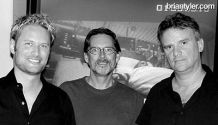 (laughs) You're welcome. (laughs) You're welcome.
BT: Yeah, you know, it's funny, I think that sometimes at the end of a movie when the director and the producers having fighting over the movie for a long time, at the very end sometimes the composer is someone that comes and can see more clearly what should be emphasized, that only because they get too close to the film, they've been watching it so many times that, by the time it comes to the scoring process they can't see the film for what it is... and sometimes it's just a matter of storytelling and it's my job to kind of make up for the focus being lost... and from the filmmakers I do my best and I'll always try my best to make the film better if possible, no matter if the film is going to be necessarily a critical success or a big blockbuster... I'll always try to make music that is worthy buying by music fans... and well I've always felt that you have to dos your best, because if you put a mediocre effort in a film it's better to pass on the film...
BS: Yeah, you're right, absolutely right...
BS: Leaving Godsend behind we would like to briefly comment with you what you're working on now.
BT: Ok.
BS: You told me at the beginning of the interview that you're working on a film called Paparazzi. What can you tell us about it?
BT: Paparazzi is a movie who revolves around the life of an actor, a new actor in Hollywood who is from Montana, and he comes out to Los Angeles with his family, and it's his first taste of fame... and of course the paparazzi...
BS: ...eat him alive...
BT: ...yeah. And his family gets involved in a car accident because the paparazzi are following them... and the movie follows him exacting revenge on the photographer that caused the accident and trying to turn the tables on him... and it kinda becomes an action film from that point...
BS: A-ha, and what kind of music are you writing?
BT: It's a... I would say, orchestral emotional themes but with a lot of modern instruments in the score. I play a lot of drums on it and base guitar... it probably covers every instrument that can be used (laughs)... it's probably my most produced and detailed score as opposed to the movie I have just finished, The Final Cut?
BS: 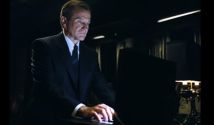 Yeah, is that the one with Robin Williams? Yeah, is that the one with Robin Williams?
BT: And Jim Caviezel. That's a very classical score...
BS: For a science-fiction movie?
BT: Yeah, no synthesizers, it's all classical ranging from a large orchestra to chamber music...
BS: Now you have tingled my curiosity (laughs).
BT: (laughs) I knew I would.
BS: (laughs) And being a classical score what has inspired you the most?
BT: I would say everything from XIX Century to XX Century, all of the way (laughs).
BS: That's quite a lot of inspiration (laughs).
BT: Yeah, primarily it's thematic and structured and has a symphonic feel to it... and there also are a few jazz pieces that I wrote... because although the film is science fiction it feels more like a 1940's noir movie... it's not black and white but it could be (laughs).
BS: (laughs) I'm all intrigued...
BT: ...And in so there's some 1940's kinda jazz music...
BS: And you have finished scoring it?
BT: Yeah, but it doesn't come out until September, but I'm really excited about it... I love the film, it's a fascinating idea the director Omar Naim has come with... it's all about memory and people's lives being recorded and edited after their deaths...
BS: Yeah, I know about the movie...
BT: ...The movie really touches on mortality and it has a wide range of emotions... and I found all that very inspiring...
BS: And apart from these two movies, are you working or will be in anything else?
BT: Yes, there are a few things (two to be accurate) on which I'm finishing the deal... and they maybe will come out before Paparazzi and Final Cut (laughs)...
BS: I think that ends it.
BT: Great, I must tell you this before we hang up; it's been a real pleasure talking with you...
BS: Well, thank you... I was going to tell you the same (laughs).
BT: (laughs) Be sure we'll talk again in the near future.
BS: Yeah, you can be sure of that. Either on Paparazzi or Final Cut, or on the other two that you haven't told me.
BT: (laughs) Yeah, those two...
BS: Then, take care and hope we talk again soon.
BT: The same to you man. Best, bye.
BS: Bye.
For more info on composer Brian Tyler, visit www.briantyler.com
Interview carried by Sergio Benítez
|





